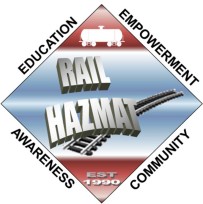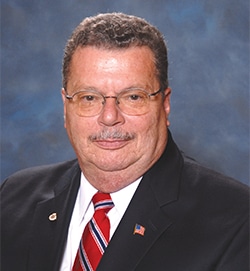Two SMART Transportation Division members and their local union brothers and sisters are in mourning after two sudden and untimely deaths.
Local 1565 member Laura Corley lost her son, Joey Trianders Allen, 43, of Lancaster, Calif., after police said a wrong-way driver slammed into his vehicle on the 405 Freeway in Los Angeles early Sunday, Feb. 16.
The driver suspected of being drunk behind the wheel in the crash that killed Allen has been charged with murder and a number of other counts associated with the crash. Services for Allen took place March 7.
In Michigan, the family of Grand Elk Railroad employee and SMART-TD Local 313 Local Chairperson Todd Vaughn is mourning the death of Vaughn’s daughter, Alison Sargent, 25.
The body of Sargent, the mother of two daughters from Pennfield Township, Mich., was found Saturday, March 7, after she had been reported missing last Thursday.
A GoFundMe account was established to assist the family and Sargent’s children by a family friend.
No suspects have been identified in Sargent’s death, and police are continuing to investigate her death as a homicide.
SMART-TD expresses its deepest sympathies to both Sister Corley and Brother Vaughn in this time of unimaginable loss to them and to their families.
Author: bnagy
SMART Transportation Division Washington State Legislative Director Herb Krohn reports that, despite a last-ditch effort by Senate Minority Leader Mark Schoesler to quash it, the two-person freight crew legislation bill passed through the state Senate by a 34-15 vote.

Krohn
Schoesler, a Republican, attempted to adjourn the legislative session rather than have the bill come up to a vote five minutes before the close of the legislative session on Friday afternoon, Krohn said.
“Schoesler attempted to shut down the Washington State Senate rather than allow our crewing bill to come to the floor for consideration and a vote,” Krohn said. “It’s an example of just how far the rail carriers and their allies are willing to go to kill off our safe train crewing bill as well as any other railroad safety legislation they oppose!”
That motion to adjourn was defeated by a party-line vote, and the bill subsequently was heard and voted upon early Friday evening.
Five Republicans and a Democrat who caucuses with them voted with every Senate Democrat in favor of the bill. The 15 senators who voted against H.B. 1841 were all Republican.
Krohn and the Washington State Legislative Board have been working for seven years to get the two-person crew legislation passed. Krohn has affectionately referred to H.B. 1841 as a “zombie” bill — it has been buried and put on hold numerous times by legislators but keeps coming back. It now enters the reconciliation phase because of differences in language involving short-line carriers between the Senate and House versions of the bill.
Krohn said the state House will consider amendments adopted by the Senate, and if representative do not agree upon the Senate amendments, a conference committee of two Democrats and one Republican from each chamber of the Legislature will be assigned to attempt to work out differences between the versions of this bill.
The deadline for the process is midnight March 12 — the last day of the 2020 legislative session. Once the reconciliation process is completed, the bill will be sent to the desk of Gov. Jay Inslee.
“We may need to mobilize again to generate high levels of constituent contacts with state legislators to get this bill across the finish line,” Krohn said.
He urged members to be on the lookout for email blasts — contact him at hskrohn55@hotmail.com — to add your name and stay up-to-date.
He thanked all TD members, their families and friends and all who helped for their persistence in advocating for the legislation and getting it closer to the governor’s desk.
“We wouldn’t be here without your support and willingness to take action to help push our train crewing bill forward,” Krohn said.

This training addresses OSHA- and DOT-required training in addition to procedures, different levels of response and worker protection in a hazardous materials emergency or release, weapons of mass destruction awareness and the incident command system. The Rail Program will conduct the 30-hour Chemical Emergency Response and OSHA 10 Hour Awareness Training Program, and the training also provides completion of the OSHA 10-Hour General Industry Outreach requirements.
The training will be held April 1 to 5 in Winslow, Ariz., in the back room of Bojo’s Grill and Sports Club 117 W. 2nd St.
The Rail Workers Hazardous Materials Training Program is funded to provide this training by a federal grant from the National Institute of Environmental Health Sciences (NIEHS). The funding provides the following student expenses: travel, lodging and meals. In addition, an incentive of $175 per day is available to all training participants of these programs, except those who are able to secure regular pay through their employer, or are paid union officers. Lodging is available to attendees traveling more than 50 miles to the workshop.
A flier about the session is available to post at your worksite.
Follow this link to register online.
For more information, call 202-624-6963 from 9 a.m. to 5 p.m. Eastern, Monday through Friday.
Richard Deiser, a former Bus Department director and union vice president, died Feb. 28. He was 79 years old.

Richard Deiser, a former Bus Department vice president, passed away Feb. 28 at age 79.
“Rich was a great union brother who will be sorely missed by those who had the pleasure to work with him,” SMART Transportation Division Vice President Calvin Studivant said. “We extend our deepest and heartfelt condolences to his wife and kids as well as all his loved ones.”
Deiser, of Dumont, N.J., was born July 2, 1940, in Bronx, N.Y. After high school, he joined the U.S. Air Force and served for eight years while also attending the University of Maryland at the same time, taking extension courses.
After his discharge from the service, he worked for many years with Trans World Airlines in the air freight, meteorology and crew scheduling departments.
He began his career as a bus operator with Rockland Coaches in 1983. Immediately active in the affairs of his local, Deiser was appointed shop steward in 1985 and elected secretary in 1988. In 1998 he was elected as general chairperson of Local 1558, Bergenfield, N.J. He was re-elected three times to that position and also attained the offices of delegate and legislative representative.
After serving for six years as alternate vice president-bus-East, Deiser was elevated to vice president and director of the Bus Department in July 2009.
He served in that capacity until his retirement in 2011.
Brother Deiser is survived by his wife of 56 years, three children, five grandchildren, a great-grandson and a number of brothers and sisters.
Family and friends are welcome to celebrate Richard’s life from 2 to 4 and 7 to 9 p.m. at Frech-McKnight Funeral Home, 161 Washington Ave., Dumont, NJ 07628. A funeral Mass is scheduled for 11 a.m. Tuesday, March 3 at St. Mary’s Roman Catholic Church in Dumont. Donations in Deiser’s memory and in lieu of flowers may be made to the Wounded Warrior Project, P.O. Box 758516, Topeka, KS 66675-8516.
SMART Transportation Division expresses its condolences to Brother Deiser’s family, friends and his brothers and sisters out of Local 1558.
Jennifer Homendy, a member of the National Transportation Safety Board (NTSB), said that the Federal Railroad Administration (FRA) final rule for Class I railroads and certain smaller railroads to establish risk-reduction safety plans issued Feb. 18 falls well short of the intent of the Rail Safety Improvement Act (RSIA) that was passed by Congress in 2008.

NTSB member Jennifer Homendy
“As the lead @TransportDems staffer who drafted the Act, I’m glad the rule’s out but it doesn’t comply with the RSIA,” Homendy said on Twitter. “It leaves out commuter and passenger railroads (that rule has been stayed 9 or 10 times now) and it fails to require freight railroads to implement fatigue management plans as part of their risk reduction program (which was required in RSIA).”
Later in her Twitter thread, she cited five accidents investigated by NTSB involving both freight and passenger rail that were linked to fatigue and reminded her followers that fatigue management is on the NTSB’s most-wanted list in preventing railroad accidents.
She also mentioned that FRA has seemed to reverse course over the years as in 2015, agency leadership had told NTSB that fatigue management would be addressed in a final rule.
The final rule as published requires Class I railroads to compose an FRA-approved RRP plan.
“These comprehensive, system-oriented safety plans are required to identify and analyze hazards and their associated risks, and develop and implement plans to eliminate or mitigate those risks,” FRA said in a release announcing the final rule. “An RRP is designed to improve operational safety, complementing a railroad’s adherence to all other applicable FRA regulations. Each railroad must tailor an RRP for its individual operations, and the RRP must reflect the substantive facts on any hazards associated with each railroads’ operations.”
“Railroads’ ongoing evaluation of their asset base and employee performance associated with operations and maintenance, under FRA regulations, can now follow a more uniform path of standardization, towards further reducing risks and enhancing safety,” FRA Administrator Ronald L. Batory said in the release.
Transportation Secretary Elaine Chao said the final rule will improve freight rail safety in America in the same release.
It remains to be seen whether fatigue management will be addressed in a future rulemaking.
Read FRA’s final rule on risk-reduction programs as published in the Federal Register.



